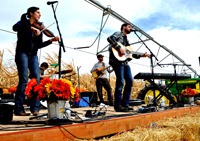On Christmas Eve in 1963, Ed Nash struck up a conversation with a bartender at Herb’s Tavern, which ended in Nash purchasing a piano for his two young daughters.
“My sister and I tried to take lessons, but we never had musical talent,” said Diane Nash McFeron, one of the recipients of the piano.
Years later, the piano was handed down to Nash McFeron in her home in Shoreline, Wash. Her 4-year-old son Ian, immediately started playing — by ear —, songs like Beethoven’s “Moonlight Sonata.”
The only time he didn’t play was during music lessons.
He was the kind of kid who wanted to make his own music.
The Ian McFeron Band performs as part of the Port of Friday Harbor Concert series July 1 and at the Rumor Mill on July 2. The band has played at various venues on San Juan for about five years.
Besides playing a piano that originated on the island, his ancestors were San Juan pioneers and now his relatives are local musicians.
“His musical talent doesn’t come directly from me, but from the Nash side of the family,” said McFeron’s mother who spent childhood summers in Friday Harbor.
Whenever the Nash family meets for family reunions on San Juan there is always music.
Either Kelly Nash breaks out his keyboard or Debbie Nash starts strumming guitar and belting out original tunes.
“It is fun to go to the San Juans with Ian and his mom because of the nostalgia they feel for the place,” said the band’s fiddle player Alisa Milner. “They also know all the cool spots, like Mt. Young, which has the most amazing view in the Pacific Northwest.”
When McFeron takes the stage on the island, he performs with an audience that he describes as “understanding the reflective mood” of his work.
“People are attracted to the islands for a different pace, maybe they are a bit more introspective,” said McFeron, who plays on San Juan twice a year. “We play for the tourists in the summer and we play for the locals in the winter.”
His mother likes to attend these concerts, to revisit her childhood and to enjoy the show.
“He’s not just our son, we’re his fans,” she said. “We really love his music.”
Making his own history
After playing piano in his early years, McFeron moved onto guitar, influenced by Bob Dylan, Simon and Garfunkel, Joni Mitchell and the Beatles.
At the University of Washington, Mcferon studied comparative history.
“We studied conflicts and how you could have two groups of people witness the same event, like Bloody Sunday [a day of violence during the Irish War of Independence] and record it differently,” he said.
During the fall and winter of 2001, McFeron traveled to Belfast, Ireland and Capetown, South Africa to study each country’s violent history and how it was documented.
In South Africa, he read the testimonies of victims, “human kind at its worst,” who suffered during the policy of white domination and racial separation known as “apartheid” in the 1950s through the 1980s.
As he learned more about a disturbing past, his relationship with a girlfriend crumbled. By the time he returned to Seattle, he was left with memories of human sufferings and a lost love.
Two years later, he produced his first album “Don’t Look Back.”
You could say he recorded his own history.
“In some ways, it’s unfair,” he said. “I feel like my side of the story is recorded in a tangible, commercial, public form.”
It wasn’t his intention to go public with his break-up. He started writing for closure, a way to continue the dialogue that stops when a relationship ends.
After playing for friends, he was persuaded to play his music at small venues and he liked the feeling of connecting with an audience.
“When you play for a great audience, they project themselves into the music,” he said. “The music reflects their own history, they deposit themselves in as the writer. That’s the most gratifying thing that can happen, that’s the most enduring.”
Starting the band
In high school, McFeron heard a fellow classmate performing at a school award’s ceremony. She played the song “Appalachia Waltz” by Mark O’Connor on the fiddle.
“I was struck by her soulful approach,” McFeron said.
Years later, when he started his own band, the sounds of her fiddle playing was still in his mind. So he tracked Alisa Milner down and according to McFeron, “It was just easy to play together.”
Their musical relationship has now endured nine years of albums, rehearsals and performances.
Other band members include bassist Norman Baker and drummer Mark Bateman.
Their upcoming performance will showcase their newest release “Summer Nights,” which was recorded in just four days and written in 2009 over a period of six months when McFeron experienced a bout of insomnia.
He spent his nights walking the streets of Seattle, gazing at the black sky and city lights and thinking about his travels in Europe and Africa. Although those trips occurred years ago, they kept, as McFeron puts it, creeping in.
So he wrote down the words flowing through his mind and those words turned into songs, which turned into the album.
“Sometimes emotions and experiences can sprawl out all over your life,” McFeron said. “Music is a process of turning abstract items into tangible objects. Performing is like holding an object in front of yourself.”




